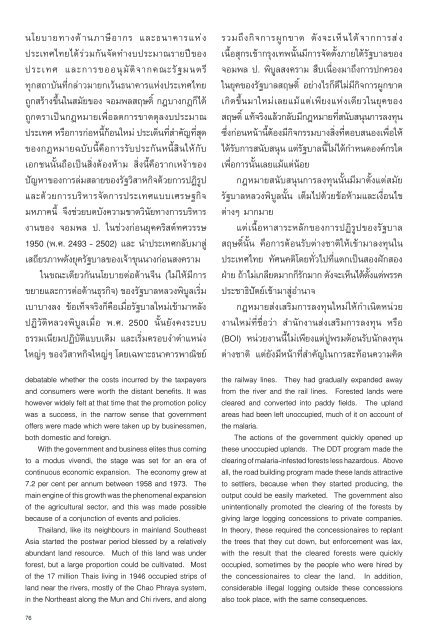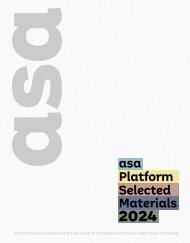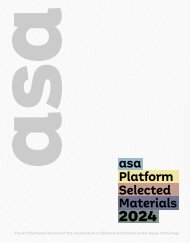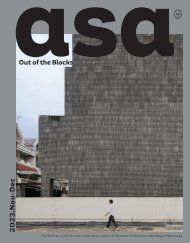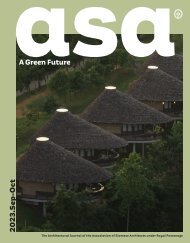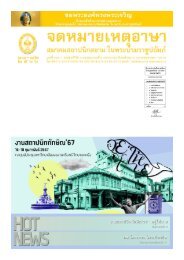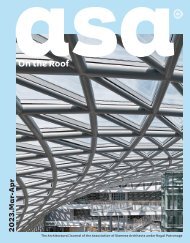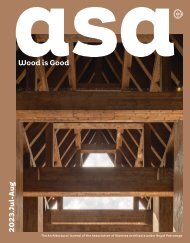บ้านเรือนถิ่นไทยในช่วงเจ็ดทศวรรษ 2489-2559
You also want an ePaper? Increase the reach of your titles
YUMPU automatically turns print PDFs into web optimized ePapers that Google loves.
นโยบายทางด้านภาษีอากร และธนาคารแห่ง<br />
ประเทศไทยได้ร่วมกันจัดทำงบประมาณรายปีของ<br />
ประเทศ และการขออนุมัติจากคณะรัฐมนตรี<br />
ทุกสถาบันที่กล่าวมายกเว้นธนาคารแห่งประเทศไทย<br />
ถูกสร้างขึ้นในสมัยของ จอมพลสฤษดิ์ กฎบางกฎก็ได้<br />
ถูกตราเป็นกฎหมายเพื่อลดการขาดดุลงบประมาณ<br />
ประเทศ หรือการก่อหนี้ก้อนใหม่ ประเด็นที่สำคัญที่สุด<br />
ของกฎหมายฉบับนี้คือการรับประกันหนี้สินให้กับ<br />
เอกชนนั้นถือเป็นสิ่งต้องห้าม สิ่งนี้คือรากเหง้าของ<br />
ปัญหาของการล่มสลายของรัฐวิสาหกิจด้วยการปฏิรูป<br />
และด้วยการบริหารจัดการประเทศแบบเศรษฐกิจ<br />
มหภาคนี้ จึงช่วยบดบังความขาดวินัยทางการบริหาร<br />
งานของ จอมพล ป. ในช่วงก่อนยุคคริสต์ทศวรรษ<br />
1950 (พ.ศ. 2493 - 2502) และ นำประเทศกลับมาสู่<br />
เสถียรภาพดังยุครัฐบาลของเจ้าขุนนางก่อนสงคราม<br />
ในขณะเดียวกันนโยบายต่อต้านจีน (ไม่ให้มีการ<br />
ขยายและการต่อต้านธุรกิจ) ของรัฐบาลหลวงพิบูลเริ่ม<br />
เบาบางลง ข้อเท็จจริงก็คือเมื่อรัฐบาลใหม่เข้ามาหลัง<br />
ปฏิวัติหลวงพิบูลเมื่อ พ.ศ. 2500 นั้นยังคงระบบ<br />
ธรรมเนียมปฏิบัติแบบเดิม และเริ่มครอบงำตำแหน่ง<br />
ใหญ่ๆ ของวิสาหกิจใหญ่ๆ โดยเฉพาะธนาคารพาณิชย์<br />
debatable whether the costs incurred by the taxpayers<br />
and consumers were worth the distant benefits. It was<br />
however widely felt at that time that the promotion policy<br />
was a success, in the narrow sense that government<br />
offers were made which were taken up by businessmen,<br />
both domestic and foreign.<br />
With the government and business elites thus coming<br />
to a modus vivendi, the stage was set for an era of<br />
continuous economic expansion. The economy grew at<br />
7.2 per cent per annum between 1958 and 1973. The<br />
main engine of this growth was the phenomenal expansion<br />
of the agricultural sector, and this was made possible<br />
because of a conjunction of events and policies.<br />
Thailand, like its neighbours in mainland Southeast<br />
Asia started the postwar period blessed by a relatively<br />
abundant land resource. Much of this land was under<br />
forest, but a large proportion could be cultivated. Most<br />
of the 17 million Thais living in 1946 occupied strips of<br />
land near the rivers, mostly of the Chao Phraya system,<br />
in the Northeast along the Mun and Chi rivers, and along<br />
76<br />
รวมถึงกิจการผูกขาด ดังจะเห็นได้จากการส่ง<br />
เนื้อสุกรเข้ากรุงเทพนั้นมีการจัดตั้งภายใต้รัฐบาลของ<br />
จอมพล ป. พิบูลสงคราม สืบเนื่องมาถึงการปกครอง<br />
ในยุคของรัฐบาลสฤษดิ์ อย่างไรก็ดีไม่มีกิจการผูกขาด<br />
เกิดขึ้นมาใหม่เลยแม้แต่เพียงแห่งเดียวในยุคของ<br />
สฤษดิ์ แท้จริงแล้วกลับมีกฎหมายที่สนับสนุนการลงทุน<br />
ซึ่งก่อนหน้านี้ต้องมีกิจกรรมบางสิ่งที่ตอบสนองเพื่อให้<br />
ได้รับการสนับสนุน แต่รัฐบาลนี้ไม่ได้กำหนดองค์กรใด<br />
เพื่อการนั้นเลยแม้แต่น้อย<br />
กฎหมายสนับสนุนการลงทุนนั้นมีมาตั้งแต่สมัย<br />
รัฐบาลหลวงพิบูลนั้น เต็มไปด้วยข้อห้ามและเงื่อนไข<br />
ต่างๆ มากมาย<br />
แต่เนื้อหาสาระหลักของการปฏิรูปของรัฐบาล<br />
สฤษดิ์นั้น คือการต้อนรับต่างชาติให้เข้ามาลงทุนใน<br />
ประเทศไทย ทัศนคติโดยทั่วไปที่แตกเป็นสองฝักสอง<br />
ฝ่าย ถ้าไม่เกลียดมากก็รักมาก ดังจะเห็นได้ตั้งแต่พรรค<br />
ประชาธิปัตย์เข้ามาสู่อำนาจ<br />
กฎหมายส่งเสริมการลงทุนใหม่ให้กำเนิดหน่วย<br />
งานใหม่ที่ชื่อว่า สำนักงานส่งเสริมการลงทุน หรือ<br />
(BOI) หน่วยงานนี้ไม่เพียงแต่ปูพรมต้อนรับนักลงทุน<br />
ต่างชาติ แต่ยังมีหน้าที่สำคัญในการสะท้อนความคิด<br />
the railway lines. They had gradually expanded away<br />
from the river and the rail lines. Forested lands were<br />
cleared and converted into paddy fields. The upland<br />
areas had been left unoccupied, much of it on account of<br />
the malaria.<br />
The actions of the government quickly opened up<br />
these unoccupied uplands. The DDT program made the<br />
clearing of malaria-infested forests less hazardous. Above<br />
all, the road building program made these lands attractive<br />
to settlers, because when they started producing, the<br />
output could be easily marketed. The government also<br />
unintentionally promoted the clearing of the forests by<br />
giving large logging concessions to private companies.<br />
In theory, these required the concessionaires to replant<br />
the trees that they cut down, but enforcement was lax,<br />
with the result that the cleared forests were quickly<br />
occupied, sometimes by the people who were hired by<br />
the concessionaires to clear the land. In addition,<br />
considerable illegal logging outside these concessions<br />
also took place, with the same consequences.


